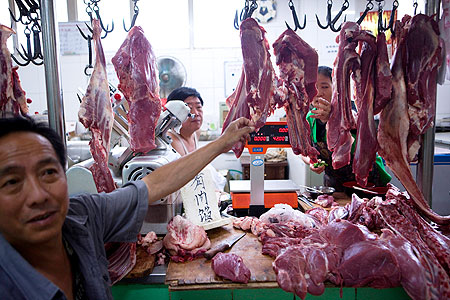
Vendors handle meat at a market in Beijing on July 11, 2011 (Photo: Adam Dean / Bloomberg via Getty Images)
One of the pleasures of traveling in China is that every hamlet seems to boast a unique gastronomic delicacy. What do you mean you haven’t tried Fuling’s famous pickled mustard tuber, locals will ask in astonishment, or Qingxu’s renowned aged vinegar? Didn’t I know the latter won a prize at an international fair in Panama back in the 1920s? (I’m afraid I didn’t.) Proud residents often hand me a treat to take home. Most recently, in the central Chinese city of Wuhan, I was given a sack of brined duck neck.
I was reminded of China’s locavore traditions earlier this month when Alice Waters visited Beijing. The California restaurateur—who revolutionized the American organic, sustainable and locally sourced food movement—was in the Chinese capital as part of a cultural exchange organized by the Asia Society and the Aspen Institute. She complimented China’s culinary heritage and the central role eating plays. “Chinese families still gather together for a meal,” enthused Waters, contrasting it to the U.S., where ever greater numbers of obese citizens gulp fast food in their cars.
But the biggest food movement in China today is less locavore than locavoid. Ever since 2008, when Chinese babies began dying from tainted milk powder, the public has been subjected to a steady diet of food scandals. Here’s an incomplete list of food found over the past few months to contain illegal additives: pork, mutton, noodles, bean curd, peppercorns, dumplings, fish, bean sprouts, wine, mushrooms and vinegar. Chemically contaminated Chinese meat now glows in the dark; watermelons burst from an excess of injected growth accelerators. “Yes, families still join together for meals,” says Zhang Yinghui, a Beijing food activist. “But the food we eat has changed. It has turned poisonous.”
(READ: The locavore’s illusion.)
As in the U.S. a century ago, when Upton Sinclair’s muckraking novel on the unregulated meatpacking industry galvanized a new age of activism, China is undergoing a consumer revolution. The Chinese, particularly those online, are venting their outrage over a violated social contract. We fill your bellies—and your bank accounts—and you don’t challenge Communist Party rule, they’re told by their leaders. But what happens when that food, in an era of underregulated capitalism, sickens and kills?
In 2007, China executed its food and drug czar for bribery. Two years later, the country unveiled its first food-safety law. Authorities this year have arrested more than 1,000 people linked to pork laced with clenbuterol, a chemical that makes meat leaner but can also sicken people. A recent crackdown uncovered more than 100 tons of illegal “gutter oil”— cooking oil scooped out of drains and reused.
Still, public confidence is plummeting. It doesn’t help that leaders are skittish about any hint of popular unrest. (Don’t forget: the Arab Spring began with a self-immolating food vendor.) Local authorities instinctively deny problems and often punish whistle-blowers. Journalists reporting aggressively on food scares have been pressured or fired. The father of a baby who fell sick after drinking melamine-laced infant formula was jailed after advocating on behalf of distraught parents.
The rich are picking up their chopsticks and leaving. A recent study found that health-and-environmental fears were among the biggest issues driving more than half of the millionaires polled to emigrate or consider doing so. Although food labeled as organic is sold in some urban supermarkets, many Chinese worry about false advertising. They should, say food activists. About the only city dwellers who eat safely are the party elite, fed on special crops delivered from special farms to special banquet halls.
In recent weeks, state-controlled media have reported that foreign firms—Lipton and Walmart, to name just two—have also failed food-safety inspections. A Chinese journalist says local media have been given a government directive to stress stories of foreign malfeasance to spread the blame. At the Asia Society event, one Chinese chef pointed out that America had exported not only the practice of massive pesticide use and genetically modified crops but also artery-clogging McDonald’s and KFC. Fair enough. The U.S. is hardly a model of food culture.
It’s hard for Chinese to know where to turn. While I was in Wuhan, I visited a fish farm where the water was adulterated by heavy-metal runoff from a nearby factory. Even the middleman buying the carp said he wouldn’t advise eating it. But our driver bought a couple anyway. It was much cheaper, he said, than at the market, and besides, fish from elsewhere in China might be even more toxic. One time, perhaps, when going local might have made Alice Waters sick to her stomach.

